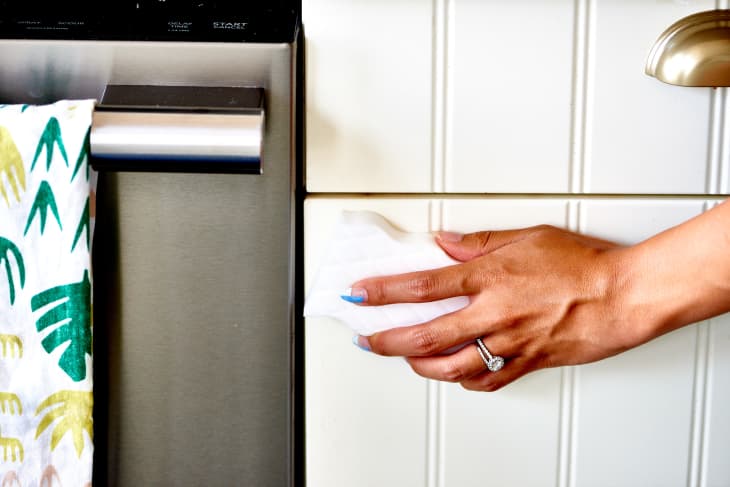How Bad is it to Clean Bare-Handed?

Growing up, I remember being mesmerized by the simple act of watching my grandmother wash dishes. She’d plunge her bare hands into the hot, sudsy water and emerge with a plate. A few passes with her trusty rag, a minute under a clean stream of water, a quick shake, and into the drying rack it’d go. Scrub, rinse, repeat. Never once during this time-honored ritual did it ever occur to me that perhaps my sweet grandma ought to have been wearing gloves. And perhaps that’s why it never occurred to me to put on gloves when I began washing dishes (and doing other cleaning) of my own.
Of course, we all know you should wear gloves to clean… but knowing and doing are two very different things. Whether it’s because we don’t have any rubber gloves handy (pun intended) or because we assume it can’t be that bad to go without, so many people—*raises hand*—never pull a pair on prior to cleaning.
It would be nice to know, though, if this habit truly is as innocuous as we like to tell ourselves it is. What’s the real deal? Could exposure to certain cleaning products be bad for your skin? Or, worse, even make you sick? How about whatever you’re cleaning? Could skipping gloves cause damage to it?
So, should you wear gloves to clean?
As is often the case with life, there isn’t just one answer to this question. It largely depends on what you’re cleaning and the product you’re using to clean it.
Washing dishes sans gloves as my grandma was prone to doing doesn’t rank high on the list of cleaning transgressions. That doesn’t mean you should go without them, though. There are myriad reasons wearing gloves during this common task could prove beneficial: you’ll have a better grip, your skin will be protected from the harsh combo of hot water and soap, and you can use hotter water—effectively killing more germs.
For most other household cleaning, however, wearing gloves is more of a must than a maybe.
This proves doubly true if you’re cleaning in the wake of illness. Per the Infection Control Department at Mid-Western Regional Hospital, wearing rubber or disposable gloves can limit the spread of sickness. This may seem obvious when it comes to bodily fluids, but the hospital also recommends wearing gloves while cleaning any linens or surfaces with which an ill person has come into contact. Think about it: now you’re talking about countertops, floors, sheets. If ever in doubt, pull on a pair of rubber gloves. You’ll be glad you did when you manage to sidestep the flu.
Anytime you use caustic cleaners such as bleach, you should be wearing gloves to protect your skin from chemical burns. You might be thinking, “Well, I’m careful” or “My skin isn’t sensitive.” RealSafety.org cautions that even cleaning solutions you consider safe could cause trouble over time. “Even chemicals that may not seem dangerous can irritate the skin over time or in individuals who are sensitive to the chemicals in question,” the outlet advises.
Enter, gloves. If you pick the right pair and get into the habit of wearing them while cleaning, you avoid serious hazards such as chemical burns as well as more minor but nevertheless pesky problems like dry skin.
And before you scoff at the notion you now need to waste precious time researching gloves, well, don’t—Safety + Health magazine offers a handy online guide that should give you an, ahem, hand-up. Spoiler alert: A good pair of rubber gloves should get you through most regular housekeeping tasks. You can get them from your local grocery store, or places like Amazon for beautiful colors, unique patterns or extra long gloves that’ll keep deep sink water from rushing in (and also make you maybe feel like both Cinderellas at once).